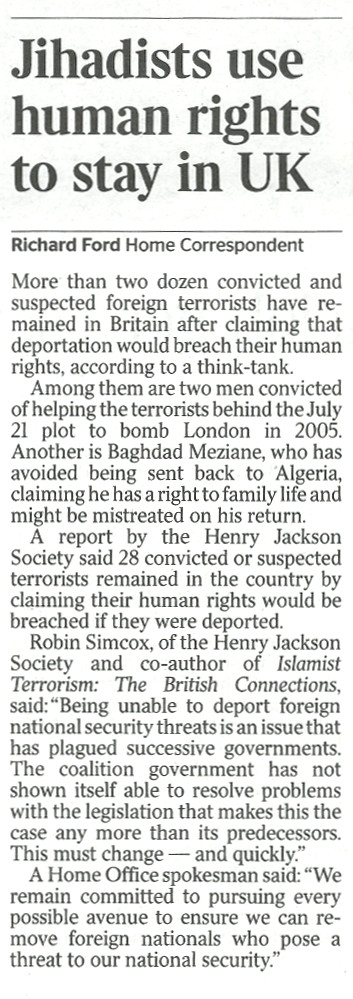Human Rights Act helps 28 Terrorists to stay in Great Britian
On Sunday The Henry Jackson Society’s Centre for the Response to Radicalisation and Terrorism’s (CRT) work was once again featured in an agenda-setting piece in the media, running under the headline ‘Human Rights Act helps 28 terrorists to stay in Britain’ on the front page of The Sunday Telegraph.The piece was entirely inspired by and conceived on the basis of CRT counter-terrorism expert Robin Simcox’s work on foreign terrorists residing in the UK and the threat they pose to our national security and that of our allies in Europe and the US.
Sunday Telegraph’s exposé relied on key HJS research.
Our coverage in The Telegraph, followed up in The Times of London on Monday (right), is part of a steady stream of high profile interventions in the public debate on issues central to CRT’s remit. Yet what is missing from this picture is the fact that the research team has become a leading and reliable source not just for the media but also in advising government on some of the most intractable security challenges of our age. Some of our most important work takes place behind the scenes. I thought it would be worthwhile to outline within the appropriate constraints some of this for our closest supporters – and hope you will find this new occasional series of interest.
Our research experts receive numerous requests for private meetings and briefings with government officials, counter-terrorism practitioners and intelligence analysts from the UK and abroad, who seek their advice and knowledge on combating the threat of radicalisation and terrorism. To give a picture of just a few recent examples, last week Research Fellow Robin Simcox was asked by the Foreign and Commonwealth Office (FCO) to brief the newly appointed UK ambassador to Yemen about the threat posed by al-Qaeda in the Arabian Peninsula (AQAP), the Yemeni branch of al-Qaeda. AQAP is not only a hugely powerful actor within Yemen, but it also poses the gravest threat to Western security of any al-Qaeda affiliate, and is a key concern for us.
In producing his major upcoming report on the fallout for the fight against terrorism around the Edward Snowden disclosures and drawing on our growing body of work on fighting terrorism in the age of Cyber in general, Robin has also for the first time been granted frank access to some of the secret machinery that exists in the UK, most famously the government’s main electronic intelligence headquarters known as GCHQ. This marks a major milestone for the CRT and indicates that the work and its impact is being taken seriously at the highest level.
Robin, along with the entire team of course also engages in all of the usual formal processes of government, with his latest evidence to the Defence Committee – on how to combat ISIS more effectively – just having been published, and the Committee’s report reflecting a number of our key recommendations.
Moreover, the CRT team has recently been called upon for private in-depth discussions at the inception stage of new counter-terror measures and policies the British government is currently developing. Without wishing to be indiscreet about our relationship with the relevant authorities, it is clear that we have moved from being the outside voice pointing out the evident danger – not always welcome – to being listened to at the heart of the policy-making apparatus designed to combat and defeat this danger.
Robin’s counterpart Hannah Stuart and our Associate Director Douglas Murray were also recently part of a separate closed consultation on these new policies in Parliament, during which the Minister of State for Security’s opening remarks were substantially based on CRT findings and recommendations. This is the result of sustained engagement with key officials working at various levels in the government machinery, such as a meeting Hannah and I had last week with the Deputy Mayor, spending several hours exploring what were clearly significantly new insights to him about this great city and it’s unfortunate threat (London is responsible for almost half of all Islamism-inspired terrorist offences in the UK).
Yet some of our most long-standing behind the scenes work involves our campus extremism expert Rupert Sutton, whose flagship product “The Weekly Digest” is a genuine must-read for relevant police and government officials in the UK’s national counter-terrorism programme. Our Student Rights division works closely with the authorities, including bespoke research aimed at particular concerns they require assistance with.
Rupert, along with other members of our research team, is also engaged in constant dialogue with the Charity Commission to expose charities abusing the system, particularly those promoting extremist views and material, while CRT is also heavily engaged in the legislative process, where relevant to our area of concern. We frequently offer input into bills before Parliament pertaining to radicalisation and terrorism, most recently the Serious Crime Bill and the Protection of Charities Bill, as covered in specialist media.
Finally, the impact of the work and our growing reputation also goes beyond the Transatlantic Alliance. Just yesterday, following the beheading of the first Japanese hostage, a senior official from Tokyo was with us, seeking our views in preparation for a new National Intelligence Estimate Prime Minister Abe has ordered following Japan’s becoming a target for Islamic State.
I hope I have been able to give some sense of the sustained hard work the team does every day, using its ever-growing expertise to build the relationships required to ensure we have real impact where it matters. Much of this will never see the public light of day. But it is a crucial part of our operation made possible by your continued support for which we are, as ever, hugely grateful.
Best wishes,
Dr Alan Mendoza
Executive Director



